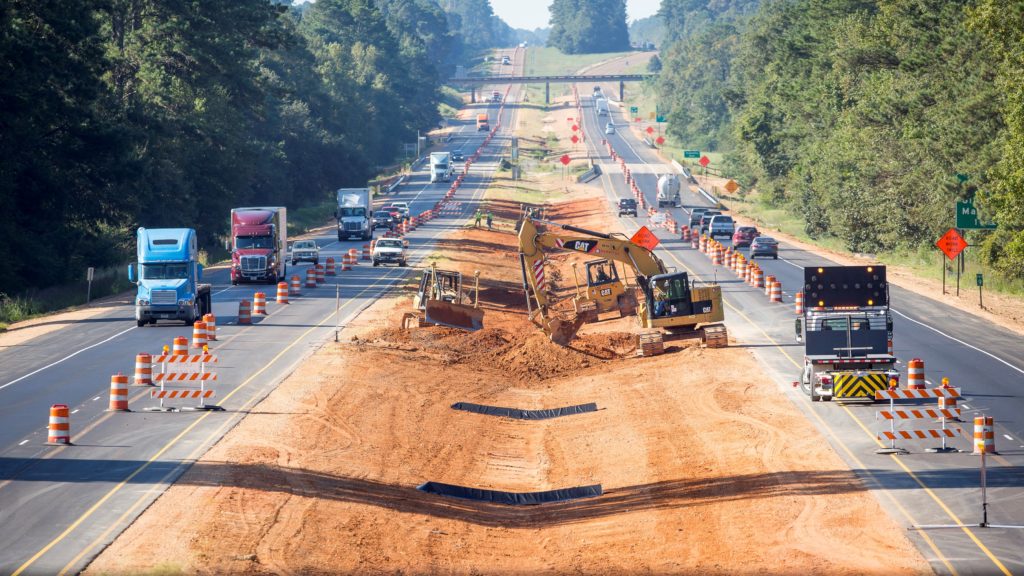
Highway construction can be a great career to embark in, although there are a few disadvantages to the trade when compared to other endeavors. This concept applies across the board to unskilled labor with a high school diploma, skilled tradesmen with a a community college degree, or engineers who attended university. It’s a rewarding career for people with the right interests and aptitudes, but doesn’t always provide the same social standing as jobs with similar education and training requirements in other fields such as the various medical field professions or law enforcement. In some ways it’s similar to factory work in terms of methods, materials, and tools used, but is set in a different environment. There are certain definitive pros and cons to highway construction anyone interested in following the career path should be aware of before taking their first job.
Easy to Enter/ Hard to Advance
After high school, someone may need to work a different job until an opening becomes available, but a young person willing to work hard can usually find a job in highway construction as unskilled labor. There will be very little training for such a position other than basic safety procedures, most learning will occur on the job. Advancement is possible, but may require outside study and certification to achieve. It’s not often a machine operator is going to have time to teach labor how to operate machinery, and the work is often too labor-intensive for someone to learn on the job how to control heavy equipment.
Outside of labor positions, there’s a growing market for civil engineers who plan the road system and highway engineers who design the physical road based on local conditions. These are often government positions and might rely on seniority rather than exceptionalism when a promotion opportunity becomes available. Due to the nature off government retirement programs, there is little turnover other than when someone ages out of the business.
In terms of ownership, construction in general is known for having lower overhead comparative to other businesses. Highway construction is a bit different in that it requires expensive heavy machinery and equipment. There are also less sub-contract opportunities as the main contractor usually provides the equipment and labor to conduct the whole job without outside help. The few exceptions tend to involve ongoing contracts with the same company, making them the sub’s “boss” at least in daily practice if not on paper.
Good Pay/ Lack of Raises
Although the pay for highway construction is good compared to labor in other fields, it’s often based on a project bid and amount of hours. As such, experience either with or outside the immediate company doesn’t always come into play. Often, pay is based on a bid placed on the project by higher up company officials and the number of hours they expect the project to take. This concept holds true for both skilled and unskilled labor.
For professionals working in logistics, sales, or engineering, their pay is likely based on market standards. They have a little more leeway to negotiate raises over time, but their pay is still based on the available budget rather than their own experience or how “good” they are at what they do. Even owners are limited in what they can set as base rates, as they have to bid against other contractors and remain competitive.
Tangible Results/ Dangerous Work Conditions
Tangible results are really great for some people when they can view exactly what they accomplished at the end of every day. They can also take pride in their job by pointing out to friends and family what they helped build. It can be grueling work at times, but for the right personality types the fact they’re tired at the end of the day actually feels good and is another source of pride.
The downside of such a pro to the job is how the work can also be dangerous. Modern jobsites have a higher level of safety standards than ever before, but there is always going to be inherent dangers with working by the side of the road with traffic driving by. Laws determine a minimum of steps to provide for employee safety and any responsible employer will go above the requirements, but there’s simply no way to control the way some people drive without concern for the hardworking men and women who keep the roads in good working order.
Office employees in the field don’t face the same level of danger, other than they may have to visit the job to assure it’s going as expected and review the progress. They do, however, get to feel the same level of participation in knowing they helped build something great which will last for years to come. They further get to be proud of their contribution to local, state, and federal infrastructure which everyone uses and appreciates.
Do You Need Equipment to Establish a Smart Work Zone in Your Worksite?
Worksafe Traffic Control Industries provides the latest in jobsite safety equipment, everything from basic work gloves to the most elaborate digital signage available. Much of our equipment is for sale or rent according to each customer’s needs. We are a woman-owned business with intricate knowledge of road construction processes, allowing each of our representatives to work directly with contractors and help determine what equipment is going to be needed to maintain safety in any specific set of circumstances. We take extra pride in providing the highest quality products and 7-day order fulfillment in order to remain competitive with similar companies in our field.








